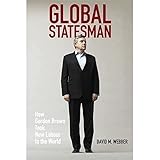Global Statesman : How Gordon Brown Took New Labour to the World / David M. Webber.
Material type: TextPublisher: Edinburgh : Edinburgh University Press, [2022]Copyright date: ©2017Description: 1 online resource (288 p.) : 7 B/W tablesContent type:
TextPublisher: Edinburgh : Edinburgh University Press, [2022]Copyright date: ©2017Description: 1 online resource (288 p.) : 7 B/W tablesContent type: - 9781474423564
- 9781474423571
- 320.941090511
- online - DeGruyter
| Item type | Current library | Call number | URL | Status | Notes | Barcode | |
|---|---|---|---|---|---|---|---|
 eBook
eBook
|
Biblioteca "Angelicum" Pont. Univ. S.Tommaso d'Aquino Nuvola online | online - DeGruyter (Browse shelf(Opens below)) | Online access | Not for loan (Accesso limitato) | Accesso per gli utenti autorizzati / Access for authorized users | (dgr)9781474423571 |
Frontmatter -- Contents -- List of Figures, Tables and Boxes -- Acknowledgements -- List of Abbreviations -- 1 A Son of the Manse with a Missionary Zeal -- 2 A World of Challenge and Opportunity -- 3 Capitalising upon Globalisation -- 4 Building a ‘New Jerusalem’ -- 5 A Matter of Life and Debt -- 6 Morals and Medicines -- 7 Coming to the Aid of Africa -- 8 Saving the World? -- Bibliography -- Index
restricted access online access with authorization star
http://purl.org/coar/access_right/c_16ec
Revisits Gordon Brown's decade as the New Labour Chancellor and his crucial but neglected attempts to eliminate global povertyFrom DFID to Brown's own faith and social philosophy, Webber explores, problematises and critiques Brown's policies on overseas aid, Third-World debt and addressing HIV/AIDS.Drawing on nearly two decades' worth of primary research, including an exhaustive survey of speeches and policy statements made by Gordon Brown both before and during his time in government, David Webber provides a body of evidence currently absent from the New Labour/UK politics literature.Discover the level of influence that Brown was able to wield in international financial institutions such as the World Bank and IMF; Ed Balls' influence on Brown from the early 1990s; and the revelatory finding that Brown’s famous ‘surprise’ decision to hand over monetary policy to the Bank of England was, in fact, made at least four years before New Labour even came to power.Key FeaturesUniquely focuses on how Brown sought to carve out his own personal place upon the world stageReveals that the newly created Department for International Development (DFID) was effectively subsumed into the Treasury rather than the Foreign Office – so that Brown could control their policy design and outputShows how demands for social justice made by civil society groups were ‘matched’ by Brown’s own faith and social philosophy, becoming co-opted and recycled into his international development policiesProblematises the ‘missionary zeal’ of Brown; his post-colonial mindset and ‘white saviour’ complex, and his tendency to offer top-down universal solutions to the global SouthCritiques the failure of the Chancellor to take account of, let alone address, the systemic inequalities created by the neoliberal development that Brown himself sought to implement
Mode of access: Internet via World Wide Web.
In English.
Description based on online resource; title from PDF title page (publisher's Web site, viewed 29. Jun 2022)


